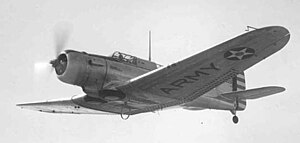The Douglas A-33 (Model 8A-5) was an American attack aircraft built in small numbers during World War II. It was an updated version of the Northrop A-17, with a more powerful engine and an increased bomb load. While the A-33 was intended initially for the export market, the entire production run was taken up by the United States Army Air Corps.
| A-33/Model 8A-5 | |
|---|---|
 Northrop A-17/Douglas A-33 | |
| General information | |
| Type | Attack aircraft |
| National origin | United States |
| Manufacturer | Douglas Aircraft Company |
| Primary user | United States Army Air Corps |
| Number built | 36 |
| History | |
| Introduction date | 1941 |
| Developed from | Northrop A-17 |
Design and development
editIn 1932, the Northrop Corporation had been formed as a partly owned subsidiary of Douglas and by 1937, the Northrop Model 8 became known as the Douglas 8A produced in the El Segundo Division of Douglas aircraft.
The 8A-5 was powered by a 1,200 hp (895 kW) Wright R-1820-87 engine and was the most powerful and best armed of the series, with four wing mounted 0.30 in machine guns, two 0.50 in machine guns in pods below the wing, a rear-firing flexibly mounted 0.30 in gun, and the ability carry up to 2,000 lb of bombs.
Operational history
editEarly in 1940, the Norwegian government ordered 36 8A-5s which not had been delivered before Norway was invaded by the Germans. Completed between October 1940 and January 1941, the aircraft were delivered to a training center in Canada that had been set up for the Norwegian government-in-exile, named "Little Norway" at Toronto Island Airport, Ontario.
After the loss of two aircraft and a reassessment of the training needs now met by the use of other aircraft, the remaining 34 Model 8A-5Ps were sold to Peru. However, 31 were repossessed by the Army Air Corps at the start of World War II. These aircraft, designated A-33, were used for training, target tug, and utility duties.[1]
Variants
edit- Model 8A-5
- A-33
- Serial numbers: 42-13584/13601; 42-109007/109019
Operators
editSpecifications (A-33)
editData from McDonnell Douglas Aircraft since 1920[2]
General characteristics
- Crew: 2
- Length: 32 ft 6 in (9.91 m)
- Wingspan: 47 ft 9 in (14.55 m)
- Height: 9 ft 4 in (2.84 m)
- Wing area: 363 sq ft (33.7 m2)
- Airfoil: root: NACA 2215; tip: NACA 2209[3]
- Empty weight: 5,510 lb (2,499 kg)
- Gross weight: 8,600 lb (3,901 kg)
- Max takeoff weight: 9,200 lb (4,173 kg)
- Powerplant: 1 × Wright GR-1820-G205A Cyclone 9-cylinder air-cooled radial piston engine, 1,200 hp (890 kW)
- Propellers: 3-bladed variable-pitch propeller
Performance
- Maximum speed: 248 mph (399 km/h, 216 kn) at 15,700 ft (4,800 m)
- Service ceiling: 29,000 ft (8,800 m)
- Time to altitude: 10,000 ft (3,000 m) in 5 minutes 48 seconds
Armament
- Guns:
- 4 × forward-firing .30 cal (7.62mm) 1919 Browning machine guns, 500rpg
- 2 × forward-firing .50 cal M2 Brownings in gun pods, 200rpg
- 1 × .30 cal (7.62mm) 1919 Browning machine gun in rear cockpit, 1,000 rounds
- Bombs: 2,000lb max load
- Internal: Up to twenty 20 lb (9.1 kg) bombs in internal racks
- External: Eight hardpoints under the fuselage, four outboard hardpoints can take 500 lb (230 kg) bombs, all eight can carry 100 lb (45 kg)
See also
editRelated development
Aircraft of comparable role, configuration, and era
- Curtiss SB2C Helldiver
- Douglas SBD Dauntless
- Fairey Barracuda
- Fairey Fulmar
- Ilyushin Il-2
- Junkers Ju 187
- Sukhoi Su-6
- Mitsubishi Ki-51
- Vultee Vengeance
- Yokosuka D4Y
References
edit- Notes
- ^ Pelletier Air Enthusiast September/October 1998, pp. 3–4.
- ^ Francillon 1979, p. 222.
- ^ Lednicer, David. "The Incomplete Guide to Airfoil Usage". m-selig.ae.illinois.edu. Retrieved 16 April 2019.
- Bibliography
- Francillon, René J. McDonnell Douglas Aircraft since 1920. London: Putnam, 1979. ISBN 0-370-00050-1.
- Pelletier, Alain J. "Northrop's Connection: The unsung A-17 attack aircraft and its legacy, Part 1". Air Enthusiast No 75, May–June 1998, pp. 62–67. Stamford, Lincolnshire: Key Publishing. ISSN 0143-5450.
- Pelletier, Alain J. "Northrop's Connection: The unsung A-17 attack aircraft and its legacy, Part 2". Air Enthusiast No 77, September–October 1998, pp. 2–15. Stamford, Lincolnshire: Key Publishing. ISSN 0143-5450.
- Wagner, Ray. American Combat Planes of the 20th Century, Third Enlarged Edition. New York: Doubleday, 1982. ISBN 978-0-930083-17-5.
- Andrade, John M. . U.S Military Aircraft Designations and Serials since 1909. Leicester: Midland Counties Publications, 1979. ISBN 0-904597-22-9.
- Swanborough, F. G. and Peter M. Bowers. United States Military aircraft since 1909. London: Putnam, 1963, 1971, 1989. ISBN 0-85177-816-X.
Further reading
edit- Instructions for the Erection and Maintenance of the Douglas Model 8A-5 Airplane. El Segundo, California: El Segundo Division, Douglas Aircraft Company. 16 September 1940. Retrieved 12 March 2021.